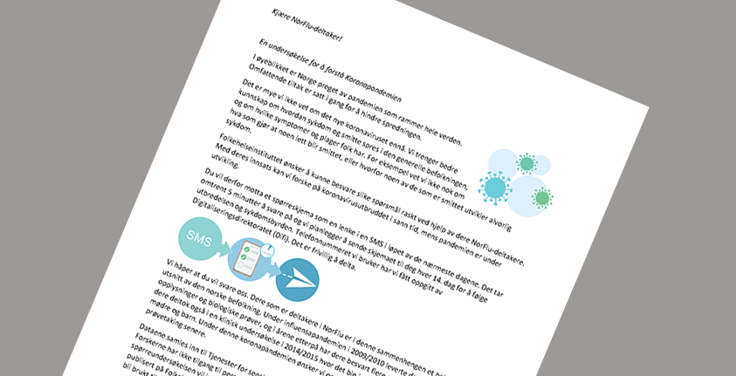NorFlu and COVID-19
Article
|Last update
When the SARS-CoV-2 pandemic reached Norway in February 2020, there was an immediate need for knowledge on the spread of the virus in the population. We therefore obtained valuable data from the existing population-cohort study, NorFlu, on COVID-19 infection and vaccination, including blood sampling to look at immunity. Here is a summary of the on-going studies.
NorFlu Coronavirus Survey
To understand more about COVID-19 symptoms, disease and vaccination in families and children, we have sent regular questionnaires to participants in the Norwegian Influenza Study (NorFlu), together with other population-based studies, since the beginning of the pandemic, see Population based studies on SARS-CoV-2 infection and vaccination in Norway.
From March 2020 to March 2022, participants in NorFlu received bi-weekly electronic questionnaires on symptoms, testing, vaccination, side effects and general health. Questions on influenza testing and vaccination have also been included.
The data has been utilised in national surveillance reports from the NIPH and for research purposes. Subsequently, questionnaires have been distributed 2-4 times a year. This has provided a population-based picture of symptom prevalence, in addition to duration and severity of symptoms in families and their children. The data is also important for investigating the prevalence of long-term symptoms, such as Long-Covid.
Furthermore, the questionnaire data is valuable for investigating new and mild vaccine side- effects. Most side effects are not recorded in national registers, and the spontaneous reporting system only provides information about those who are vaccinated, making it challenging to establish a basis for comparison. The duration of side effects can also be recorded, at different time intervals. This is important for capturing neurological outcomes that may occur after a long latency period. Cohorts are suitable for understanding why some people experience severe side effects while others do not and for understanding why some experience exacerbation of chronic diseases.
The study has ethical approval from the Regional Committees for Medical and Health Research Ethics Southeast (18403). The project manager is Lill Trogstad.
Epigenetic study to explore the mechanisms of long-COVID
The Norwegian Institute of Public Health is studying why some people experience prolonged symptoms after COVID-19 (so called “long-COVID”). Through epigenetic analyses, we are examining whether there are differences in the genes that are turned on or off in individuals who develop long-term symptoms compared to those who do not. Blood samples have been collected from NorFlu and MoBa participants who reported being infected with SARS-CoV-2 during the Omicron wave in the spring of 2022 and participants who did not get infected with the virus during this period.
Approximately 300 adults from NorFlu and MoBa were invited to participate according to the three following groups:
- participants confirmed with SARS-CoV-2 infection and long-covid symptoms
- participants confirmed with SARS-CoV-2 infection but no long-covid symptoms
- non-infected participants
The participants were sampled in April 2023. Previous samples (prior to infection) have also been collected from these participants early in the 2020 pandemic. DNA samples have been extracted in order to explore the epigenetic changes (DNA methylation) before and after SARS-CoV-2 infection, which may help explain some of the mechanisms related to long-covid. Likewise, plasma samples from the equivalent participants and time points will be analysed together with Oslo University Hospital to explore if immune exhaustion markers are related to neurological long-covid symptoms.
The study has ethical approval from the Regional Committees for Medical and Health Research Ethics Southeast (229359). Informed consent was obtained from all participants. The project manager is Lill Trogstad
About the NorFlu-corona biostudy
The aim of this study is to investigate the seroprevalence, and immune responses after SARS-CoV-2 infection and vaccination in adults and children from the NorFlu cohort.
In this study, we are collecting longitudinal blood samples from a subset of about 200 NorFlu families. Initially, samples were used to examine the prevalence of antibodies against SARS-CoV-2 in the population of Oslo, to measure the spread of the novel virus. Through more advanced analyses, we are also studying the body's immune response to the infection, including humoral and cellular immunity and determinants of severity of the disease, in close collaboration with Oslo University Hospital (OUS). Additionally, we want to investigate the immune response to influenza and other respiratory diseases.
Peripheral mononuclear cells (PBMCs), plasma and DNA have been isolated and are stored in the biobank the NIPH.
The study has ethical approval from the Regional Committees for Medical and Health Research Ethics Southeast (18403). Informed consent was obtained from all participants. The project manager is Lill Trogstad.


